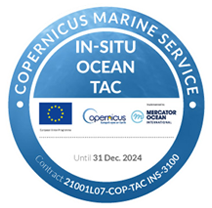
>>> Observations integrated in the INS-TAC Product
Nologin works along with Puertos del Estado, leader of the Near Real Time operations in the IBI area (Iberia-Biscay-Ireland), in the development and definition of the service, as well as in the validation and distribution of reprocessed products for wave and sea level parameters.
The Client
The Copernicus Marine Service is a provider of free and open marine data and services to enable marine policy implementation, support Blue growth and scientific innovation.
The Copernicus Marine Service (or Copernicus Marine Environment Monitoring Service), it is funded by the European Commission (EC) and implemented by Mercator Ocean International.
The Challenge
To collect multi-source, multi-platform, heterogenous data, perform consistent quality control and distribute resulting products through the Copernicus Marine Service for both Near Real Time observations in the IBI region and reprocessed wave and sea level global observations.
The Copernicus Marine IBI In Situ TAC is an oceanographic operational service aimed to the integration of marine environmental measurement networks in global and european basins, generating reprocessed products based on in situ observations. This service operates with real-time data measured for oceanographic variables ( water temperature, salinity, currents,, swell...) , meteorological (wind, rainfall, atmospheric pressure...) and biogeochemical (oxygen, chlorophyll, carbon)).

>>> In situ TAC Dashboard from Copernicus Marine Service
The Results
We are able to manage data coming from more than 10.000 platforms, involving a wide range of oceanographical and meteorological variables
The operational framework of the project involves a complex technological challenge, given the volume of data handled, the heterogeneous type of measuring platform (buoys, tide gauges, vessels, profilers, HF radars…), the varied nature of the data (time series, profiles, spectral data, etc.) and the great diversity of sources and data providers.
Adquisition is just one part of our business. We are commited with adding value to the data, enhancing the data quality control through agreed procedures following expert recommendations in coherence with international agreements, and increasing the metadata information linked with the observations.
Aligned with this aim of improving data quality, we design and develop tools for automathic validation and data visualization, which finally represent the “know-how”core of our reprocessing activities.



